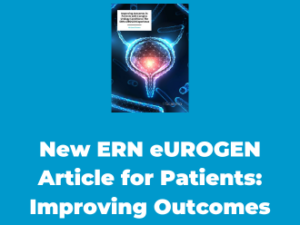COVID-19: eUROGEN Statement and Resources
Posted on 8 October 2020 in News
During these difficult and unprecedented times, ERN eUROGEN hopes that all of our patients, collaborators, and their families can manage with their health requirements as best as possible, and wishes them the strength needed to get through this crisis.
Please follow your National, Local and Healthcare Provider advice. Local protocols on how to proceed have been developed by experts with your best care in mind.
Below is a list of resources and information we feel may be helpful:
- The World Health Organisation (WHO) has issued recommendations for protective measures against coronavirus.
- EURORDIS has created a COVID-19 Information Resource Centre and published statements regarding the special needs of patients with a rare disease. They also ran a webinar on the impact of COVID 19 for people living with a Rare Disease.
- The European Association of Urology (EAU) has published COVID-19 Resources for Urologists including Rapid Reaction Recommendations.
- ERN eUROGEN and the European Association of Urology (EAU) ran a webinar on Urology in the COVID-19 era.
- An EAU paper has been accepted by the Journal of Pediatric Urology on the clinical and surgical consequences of the COVID-19 pandemic for patients with pediatric urological problems.
- There is a dedicated European Commission (EC) webpage for actions relating to the ERNs and Covid-19.
- The EC has launched the COVID-19 Clinical Management Support System based on the ERN experience to help doctors exchange expertise concerning COVID-19.
- The EC has financed 17 new clinical trials after launching a request for expressions of interest entitled “SC1-PHE-CORONAVIRUS-2020: Advancing knowledge for the clinical and public health response to the [COVID-19] epidemic” with a budget of €10 million subsequently increased to €47.5 million.
- The EC has published Guidance on the Management of Clinical Trials during the COVID 19 (Coronavirus) pandemic to mitigate the negative effects of the COVID-19 pandemic on developing research, and to ensure the rights, safety and wellbeing of participants.
- The EC is funding a programme of training of healthcare professionals in intensive care skills to support frontline clinicians dealing with COVID-19. Training is free of charge and available for every doctor and nurse working in a hospital with an Intensive Care Unit, in all 27 EU Member States and the UK. For information/registration please go to the dedicated webpage.
- Two new codes to identify COVID-19 using ICD-10 classification have been approved and implemented into the CPMS production and training environment.
- U07.1 COVID-19, virus identified – An emergency ICD-10 code to be assigned to a disease diagnosis of COVID-19 confirmed by laboratory testing.
- U07.2 COVID-19, virus not identified – An emergency ICD-10 code to be assigned to a clinical or epidemiological diagnosis of COVID-19 where laboratory confirmation is inconclusive or not available.




